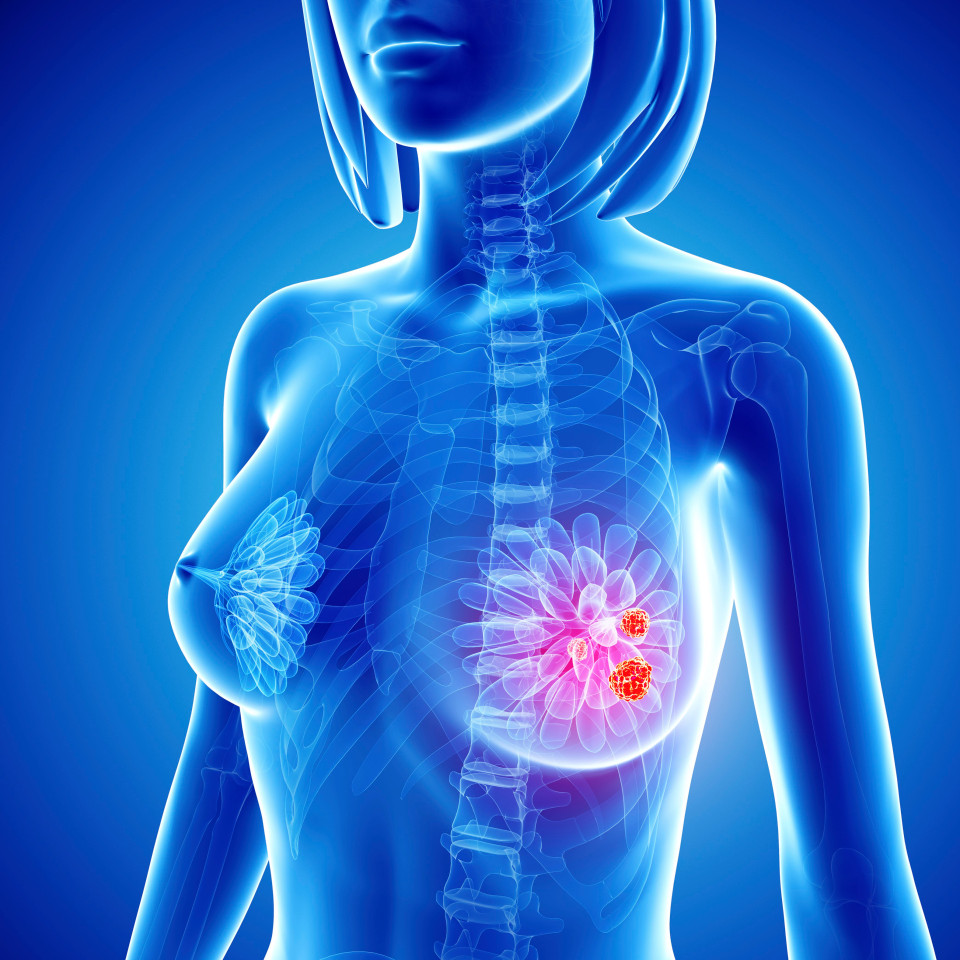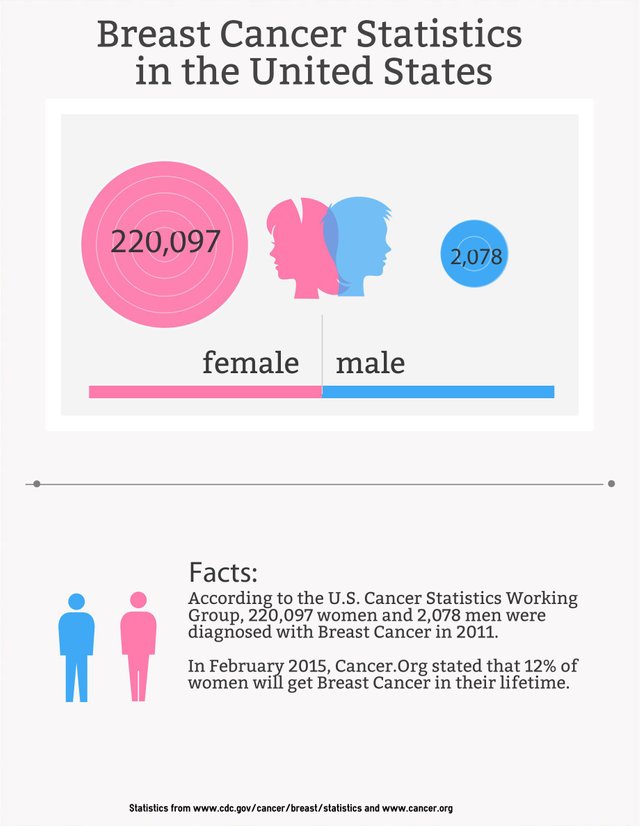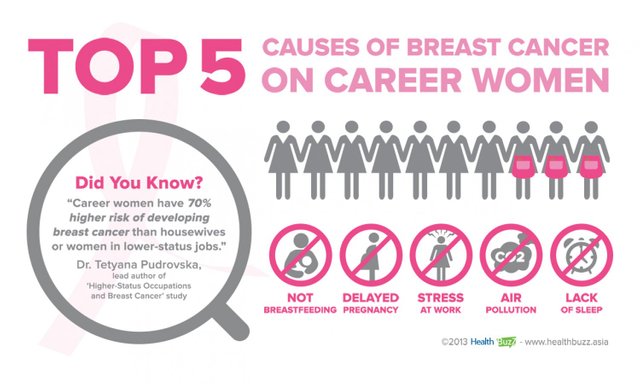What is breast cancer?
Breast cancer is a malignant tumor (a collection of cancer cells) arising from the cells of the breast. Although breast cancer predominantly occurs in women, it can also affect men.
But in this particular article, let’s focus on women.

Who gets infected by cancer of the breast?
Breast cancer is rare in men (approximately 2,400 new cases diagnosed per year in the U.S.) but typically has a significantly worse outcome. This is partially related to the often late diagnosis of male breast cancer, when the cancer has already spread.
Symptoms are similar to the symptoms in women, with the most common symptom being a lump or change in skin of the breast tissue or nipple discharge. Although it can occur at any age, male breast cancer usually occurs in men over 60 years of age.

.jpg)
What causes breast cancer?
There are many risk factors that increase the chance of developing breast cancer. Although we know some of these risk factors, we don't know the cause of breast cancer or how these factors cause the development of a cancer cell.
We know that normal breast cells become cancerous because of mutations in the DNA, and although some of these are inherited, most DNA changes related to breast cells are acquired during one's life.
Proto-oncogenes help cells grow. If these cells mutate, they can increase growth of cells without any control. Such mutations are referred to as oncogenes. Such uncontrolled cell growth can lead to cancer.


What are breast cancer risk factors? How do you get breast cancer?
Some of the breast cancer risk factors can be modified (such as alcohol use) while others cannot be influenced (such as age). It is important to discuss these risks with a health-care provider anytime new therapies are started (for example, postmenopausal hormone therapy).
Several risk factors are inconclusive (such as deodorants), while in other areas, the risk is being even more clearly defined (such as alcohol use).
The following are risk factors for breast cancer:
• Age: The chances of breast cancer increase as one gets older.
• Family history: The risk of breast cancer is higher among women who have relatives with the disease. Having a close relative with the disease (sister, mother, daughter) doubles a woman's risk.
• Personal history: Having been diagnosed with breast cancer in one breast increases the risk of cancer in the other breast or the chance of an additional cancer in the original breast.
• Women diagnosed with certain benign breast conditions have an increased risk of breast cancer. These include atypical hyperplasia, a condition in which there is abnormal proliferation of breast cells but no cancer has developed.
• Menstruation: Women who started their menstrual cycle at a younger age (before 12) or went through menopause later (after 55) have a slightly increased risk.
• Breast tissue: Women with dense breast tissue (as documented by mammogram) have a higher risk of breast cancer.
• Race: White women have a higher risk of developing breast cancer, but African-American women tend to have more aggressive tumors when they do develop breast cancer.
• Exposure to previous chest radiation or use of diethylstilbestrol increases the risk of breast cancer.
• Having no children or the first child after age 30 increases the risk of breast cancer.
• Breastfeeding for one and a half to two years might slightly lower the risk of breast cancer.
• Being overweight or obese increases the risk of breast cancer both in pre- and postmenopausal women but at different rates.
• Use of oral contraceptives in the last 10 years increases the risk of breast cancer slightly.
• Using combined hormone therapy after menopause increases the risk of breast cancer.
• Alcohol use increases the risk of breast cancer, and this seems to be proportional to the amount of alcohol used. A recent study reviewing the research on alcohol use and breast cancer concluded that all levels of alcohol use are associated with an increased risk for breast cancer. This includes even light drinking.
• Exercise seems to lower the risk of breast cancer.
• Genetic risk factors: The most common causes are mutations in the BRCA1 and BRCA2 genes (breast cancer and ovarian cancer genes). Inheriting a mutated gene from a parent means that one has a significantly higher risk of developing breast cancer.
What about antiperspirants or deodorants as causes of breast cancer?
Research has shown that parabens (a preservative used in deodorants) can build up in breast tissues. However, this study did not show that parabens cause breast cancer or that the parabens (which are found in many other products) were linked to the use of deodorants.
A 2002 study did not show any increased risk for breast cancer in women using an underarm deodorant or antiperspirant. A 2003 study showed an earlier age for breast cancer diagnosis in women who shaved their underarms more frequently and used underarm deodorants.
More research is needed to give us the answer about a relationship between breast cancer and underarm deodorants and blade shaving.
SO IF THIS SUBJECT WAS HELPFUL, PLEASE UPVOTE, COMMENT AND RESTEEM SO THE WHOLE WORLD CAN BE AWARE OF THIS DEADLY DISEASE CALLED "BREAST CANCER".
PLEASE STAY TUNED FOR THE CONCLUDING PART OF THIS TOPIC (SYMPTOMS, PREVENTION AND TREATMENT.
THANKS
Hi! I am a robot. I just upvoted you! I found similar content that readers might be interested in:
https://www.medicinenet.com/breast_cancer_facts_stages/article.htm
Downvoting a post can decrease pending rewards and make it less visible. Common reasons:
Submit
Wouldn't it be great if we could cure/prevent cancer in the next 10-20 years! Lets' hope
Downvoting a post can decrease pending rewards and make it less visible. Common reasons:
Submit
Early detection help a lot
Downvoting a post can decrease pending rewards and make it less visible. Common reasons:
Submit
My mother suffers from breast cancer and none of her doctors tells her that there are simpler and cheaper solutions for the treatment of this disease. Does this mean that there are no preventive measures that can ease the course of the disease?
Downvoting a post can decrease pending rewards and make it less visible. Common reasons:
Submit
There is a prophylactic for cancer treatment that I heard about very recently in the company of friends. If you want to know more precise information about sodium dichloroacetate, I advise you to go to the website which is entirely devoted to this topic. You can also look there at the prices of DCA offered by various manufacturers.
Downvoting a post can decrease pending rewards and make it less visible. Common reasons:
Submit